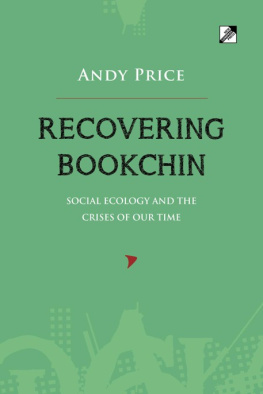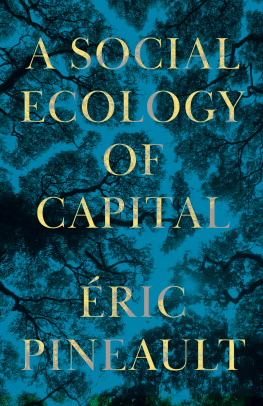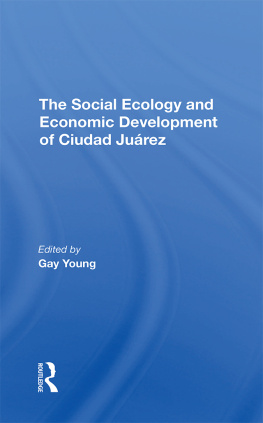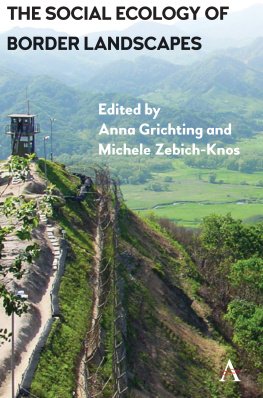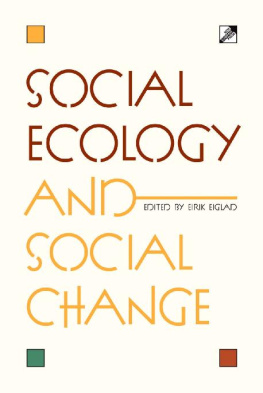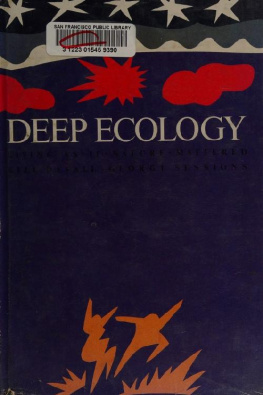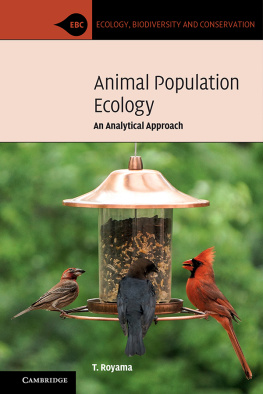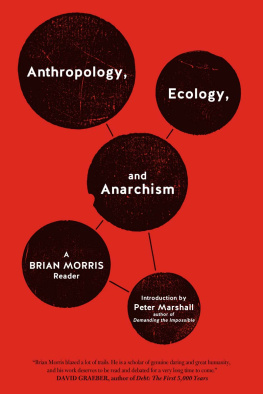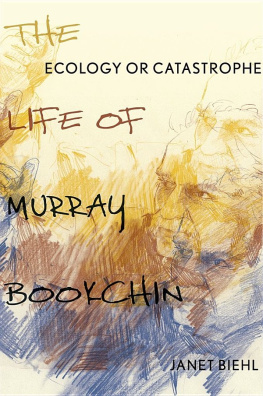Andy Price - Recovering Bookchin: Social Ecology and the Crises of Our Time
Here you can read online Andy Price - Recovering Bookchin: Social Ecology and the Crises of Our Time full text of the book (entire story) in english for free. Download pdf and epub, get meaning, cover and reviews about this ebook. year: 2012, publisher: New Compass Press, genre: Science. Description of the work, (preface) as well as reviews are available. Best literature library LitArk.com created for fans of good reading and offers a wide selection of genres:
Romance novel
Science fiction
Adventure
Detective
Science
History
Home and family
Prose
Art
Politics
Computer
Non-fiction
Religion
Business
Children
Humor
Choose a favorite category and find really read worthwhile books. Enjoy immersion in the world of imagination, feel the emotions of the characters or learn something new for yourself, make an fascinating discovery.
- Book:Recovering Bookchin: Social Ecology and the Crises of Our Time
- Author:
- Publisher:New Compass Press
- Genre:
- Year:2012
- Rating:3 / 5
- Favourites:Add to favourites
- Your mark:
- 60
- 1
- 2
- 3
- 4
- 5
Recovering Bookchin: Social Ecology and the Crises of Our Time: summary, description and annotation
We offer to read an annotation, description, summary or preface (depends on what the author of the book "Recovering Bookchin: Social Ecology and the Crises of Our Time" wrote himself). If you haven't found the necessary information about the book — write in the comments, we will try to find it.
Andy Price: author's other books
Who wrote Recovering Bookchin: Social Ecology and the Crises of Our Time? Find out the surname, the name of the author of the book and a list of all author's works by series.
Recovering Bookchin: Social Ecology and the Crises of Our Time — read online for free the complete book (whole text) full work
Below is the text of the book, divided by pages. System saving the place of the last page read, allows you to conveniently read the book "Recovering Bookchin: Social Ecology and the Crises of Our Time" online for free, without having to search again every time where you left off. Put a bookmark, and you can go to the page where you finished reading at any time.
Font size:
Interval:
Bookmark:
COPYRIGHT
Recovering Bookchin:
Social Ecology and the Crises of Our Time
2012 by Andy Price
ISBN 978-82-93064-16-9
ISBN 978-82-93064-17-6 (ebook)
Published by New Compass Press
Grenmarsvegen 12
N3912 Porsgrunn
Norway
Design and layout by Eirik Eiglad
New Compass presents ideas on participatory democracy, social ecology, and movement buildingfor a free, secular, and ecological society.
New Compass is Camilla Svendsen Skriung, Sveinung Legard, Eirik Eiglad, Peter Munsterman, Kristian Widqvist, Lisa Roth.
new-compass.net
2012
F OR L OUISE
ANDY PRICERECOVERING BOOKCHIN
SOCIAL ECOLOGY AND THE CRISES OF OUR TIME

new-compass.net
Preface
A t an academic conference several years ago, I attended a workshop directed to an examination of Murray Bookchin and his place in the anarchist tradition. There, after giving a paper I had rather hastily cobbled together (I was a young, and not very adept researcher) from the opening years of my research on Bookchins philosophical and political programme, I was confrontedcollegially, and in good spirit, it should be notedby a colleague who proceeded to tell me all about Bookchins personal and political motivations. Agitated and animated, my erstwhile colleague told me that throughout the 1990s, Bookchin had bestrode the anarchist world, looking to pick a fight with anyone and everyone, desperate for a conflagration, desperate for attention. I watched, bemused, as my colleague raised his arms in the vein of a muscle man, bending both arms to show his strength, seemingly a likeness of Bookchins position down the years. Although I cannot be sure of the precise memory, I think he may have even shadow-boxed to illustrate Bookchins pugilistic intentions.
The rhetorical and visual fireworks aside, this description of Bookchin jarred on a more fundamental level. I was stuck by two immediate questions. First, was my colleague speaking of the same Bookchin whose philosophy I had been immersed in for what seemed like a lifetime, a philosophy I found creative, cooperative, inspiring and, above all, humanistic? Was this the same Bookchin who had spent years refining a political programme that was explicitly directed towards the creation of a society of genuine equality, freedom, and above all, non-conflictual forms of relations and forms of organisations? Second, how did my friend know of Bookchins motivations? How did he know that Bookchin wanted to fight the rest of the anarchist world, know that he was desperately seeking people to argue with? Was there any evidence for such a position?
Of course, I had been aware of Bookchins polemical works before my exchange with my colleague, and I had been aware of the many disagreements Bookchin had had with former friends and comrades, but I originally intended to ignore these polemics, to put them down to the usual political manoeuvre and disagreement that quite naturally emerges in the exchange of ideas. Mine was to be a project directed solely to an examination of Bookchins content , to the fundamentals of his philosophical and political project. However, it soon became apparent that I could not avoid this problematic picture of Bookchin: I would meet many more people who would describe Bookchin in exactly the same way (gesticulation included); I would read many more texts that claimed identical things. Moreover, it became apparent that this was many peoples experience of Bookchin: that is, the newcomer to Bookchin cannot help but be confronted in the first instance (and quite possibly overwhelmed) by the critical literature on Bookchin.
Yet the more I read of Bookchin, the more the evidence of a genuine attempt to remake society in the name of humanity and the natural world would pour from the pages of his work. I thus concluded early on, that the initial and immediate picture of Bookchin was a caricature : it underplayed and undervalued a rich and detailed philosophy of nature and a practical political programme, worked out in great detail over the previous five decades by focusing on the relatively short period within which he had become embroiled in fierce disagreements. Originally, I argued that this vast body of work, when fully appreciated, would easily make-up for whatever Bookchin had done wrong in the 1980s and 1990s, that whatever mistakes he had made, this important contribution was still intact.
However, as I turned, with trepidation, to examine Bookchins wrongdoings, the problems that led to an extraordinary body of literature that casts his motives in to doubt, it soon became clear that Bookchin had in fact done very little wrong. There was, in short, no evidence of Bookchin becoming dogmatic, controlling or aggressive in his later years, as the critical literature claimed: quite to the contrary, there was evidence that the works and moments in Bookchins biography that the critics would point to for their evidence of his ill-found motivations were in fact coherent expressions of his wider philosophy, and, by-and-large, informed critiques and challenges to the movements with which he was involved. Moreover, the most problematic of the criticisms of Bookchin never addressed his philosophical and theoretical fundamentals or even the criticisms he raised that were held up as evidence of his desire to attack.
It is from these early developments that the analytical framework of the current work stemmed. In the first instance, its aim is to recover the vital contribution to radical social thought that Bookchin provides in his work, a contribution that has been partially lost to the more problematic picture discussed above, by examining and exposing the foundations of the Bookchin caricature. In the second instance, this recovery also extends to the more robust critical pieces on Bookchin. It is argued here that there have been serious and reasoned critiques made of Bookchin, but that these too suffer from the existence of such a skewed caricature. They have often been mired by the more problematic literature, themselves not fully appreciated. They too will be recovered here from the rancour that surrounds Bookchin and his opponents and used to put Bookchins foundations to the test. Finally, this recovery and reassessment, in keeping with Bookchins own approach, is carried out not solely as a theoretical exercise, but as an examination of a theory that may suggest practical political possibilities to reverse the social and ecological crises of our time.
I n terms of acknowledgements, then thanks must go first to Professor Jules Townshend for years of mentoring and support. Thanks also to Eirik Eiglad and his colleagues at New Compass for their commitment and drive. To Chris Haworth for an unwavering interest in my workand for proof reading. To my great friend, John Gregory for a constant supply of real discussion and for the steady stream of insights that only the artist can supply. But finally, most of all, this book would not have been possible without Louise, whose support in every conceivable sense is beyond anything I could ever put into words.
Introduction
I n 1982, at the age of sixty one, Murray Bookchin published the first of his two major works, The Ecology of Freedom , consolidating a career as one of the most innovative thinkers of the Left of the latter half of the twentieth century: a thinker who had formulated a body of work that brought together the radical strands of both anarchism and the ecology movement. Exactly thirty years earlier he had announced himself to the world of critical social theory with something completely new: in the radical German publication, Dinge der Zeit and its English sister publication, Contemporary Issues, he wrote the ecological critique The Problem of Chemicals in Food, one of the earliest attempts to draw attention to the effect industrial-scale agribusiness was having on food production in the first instance and on the environment more widely.
Next pageFont size:
Interval:
Bookmark:
Similar books «Recovering Bookchin: Social Ecology and the Crises of Our Time»
Look at similar books to Recovering Bookchin: Social Ecology and the Crises of Our Time. We have selected literature similar in name and meaning in the hope of providing readers with more options to find new, interesting, not yet read works.
Discussion, reviews of the book Recovering Bookchin: Social Ecology and the Crises of Our Time and just readers' own opinions. Leave your comments, write what you think about the work, its meaning or the main characters. Specify what exactly you liked and what you didn't like, and why you think so.

